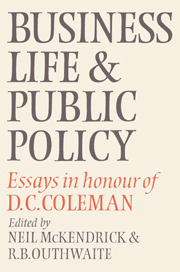Book contents
- Frontmatter
- Contents
- Preface
- List of contributors
- 1 Piscatorial politics in the early Parliaments of Elizabeth I
- 2 Marriage as business: opinions on the rise in aristocratic bridal portions in early modern England
- 3 Age and accumulation in the London business community, 1665–1720
- 4 The use and abuse of credit in eighteenth-century England
- 5 Convicts, commerce and sovereignty: the forces behind the early settlement of Australia
- 6 ‘Gentleman and Players’ revisited: the gentlemanly ideal, the business ideal and the professional ideal in English literary culture
- 7 The City, entrepreneurship and insurance: two pioneers in invisible exports – the Phoenix Fire Office and the Royal of Liverpool, 1800–90
- 8 ‘At the head of all the new professions’: the engineer in Victorian society
- 9 Bernard Shaw, Bertold Brecht and the businessman in literature
- 10 Lost opportunities: British business and businessmen during the First World War
- 11 Ideology or pragmatism? The nationalization of coal, 1916–46
- Bibliography of D. C. Coleman's published works
- Index
1 - Piscatorial politics in the early Parliaments of Elizabeth I
Published online by Cambridge University Press: 07 October 2009
- Frontmatter
- Contents
- Preface
- List of contributors
- 1 Piscatorial politics in the early Parliaments of Elizabeth I
- 2 Marriage as business: opinions on the rise in aristocratic bridal portions in early modern England
- 3 Age and accumulation in the London business community, 1665–1720
- 4 The use and abuse of credit in eighteenth-century England
- 5 Convicts, commerce and sovereignty: the forces behind the early settlement of Australia
- 6 ‘Gentleman and Players’ revisited: the gentlemanly ideal, the business ideal and the professional ideal in English literary culture
- 7 The City, entrepreneurship and insurance: two pioneers in invisible exports – the Phoenix Fire Office and the Royal of Liverpool, 1800–90
- 8 ‘At the head of all the new professions’: the engineer in Victorian society
- 9 Bernard Shaw, Bertold Brecht and the businessman in literature
- 10 Lost opportunities: British business and businessmen during the First World War
- 11 Ideology or pragmatism? The nationalization of coal, 1916–46
- Bibliography of D. C. Coleman's published works
- Index
Summary
In our period State action in economic and social matters can be seen as having four main ends in view: the maintenance of social stability and order; the encouragement and regulation of the internal economy; the encouragement and regulation of overseas trade and shipping; and the raising of revenue.
Thus Donald Coleman sums up a well-known problem and its usual conclusion. His phrasing is cautious: ‘state action’ must be taken to include the legislation of Parliament, but the possibility that the initiative behind such laws might have come from unofficial quarters is not expressly excluded. Nevertheless, the mention of public order and public revenue does suggest that the author had it in mind here to equate the state with its government. That conviction – that Elizabethan economic legislation originated in official circles and reflected thinking there – is well entrenched in the literature; it goes back at the least to Archdeacon Cunningham, who decided that ‘the more we examine the working of the Elizabethan scheme for the administration of economic affairs, the more do we see that the Council was the pivot of the whole system’, as initiators and executors. The only person who has dared to question the assumption was F. J. Fisher, though even he in the end resigned himself to the concept of government action, called forth in his view not by sovereign planning but by the haphazard pressures of the market and other circumstances.
- Type
- Chapter
- Information
- Business Life and Public PolicyEssays in Honour of D. C. Coleman, pp. 1 - 20Publisher: Cambridge University PressPrint publication year: 1986
- 1
- Cited by



